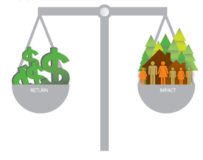
Bron
McKinsey
With the fraying contract between society and business an urgent priority, many companies and banks are eager to find investments that generate business and social returns. One avenue is “impact investing,” directing capital to enterprises that generate social or environmental benefits—in projects from affordable housing to sustainable timberland and eye-care clinics—that traditional business models often sidestep. The mistaken rap on this kind of “social” investment is that returns are weak and realizing them takes too long. McKinsey research in India—a testbed of new impact-investment ideas, where some 50 investors have poured $5.2 billion into projects since 2010 and investment is growing at a 14 percent annual clip—presents a different perspective. McKinsey tested four notions that have made mainstream investors shy. The findings suggest that as more companies and larger investors become acquainted with the true state of play, in India and elsewhere, they’ll find investment opportunities that align with their social and business aims.
Impact investments in India have demonstrated how capital can be employed sustainably and how it can meet the financial expectations of investors. We looked at 48 investor exits between 2010 and 2015 and found that they produced a median internal rate of return (IRR) of about 10 percent. The top one-third of deals yielded a median IRR of 34 percent, clearly indicating that it is possible to achieve profitable exits in social enterprises.





